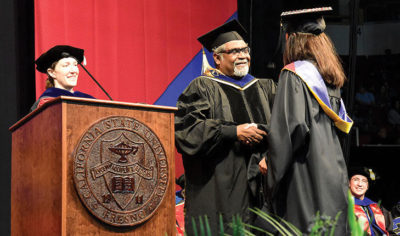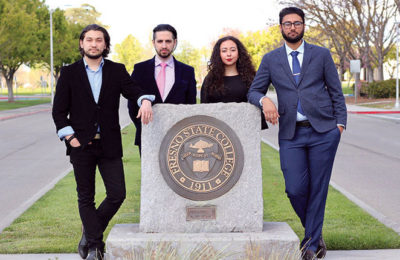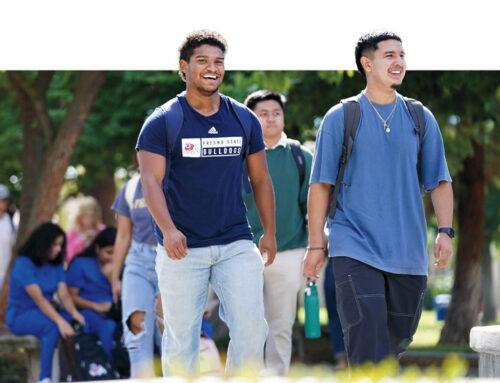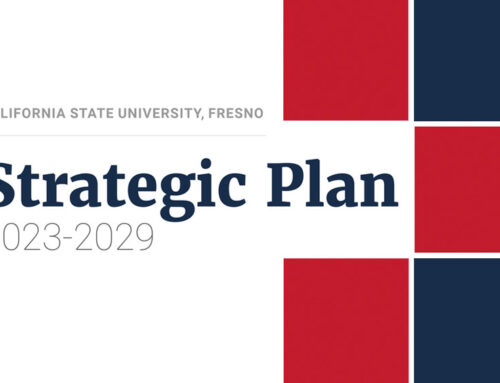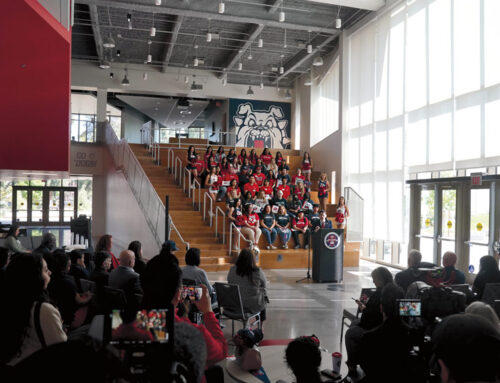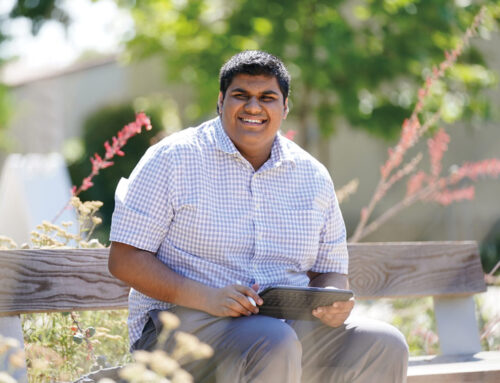FRESNO STATE NEWS BRIEFS
A Snapshot in Time
It was mid-March when in-person classes were canceled at Fresno State and virtual instruction, social distancing and stay-at-home orders became the new catchphrases of the time. It was only natural that the immediate reaction by many faculty and staff was to focus on what they could do for students to continue to ensure their success. Whether showing compassion, coming up with innovative solutions or just being there for each other, faculty shared their thoughts on social media — thoughts that we’ll look back on when we talk about the COVID-19 pandemic that once was.
5 Tips to Stay Active
During Social Distancing
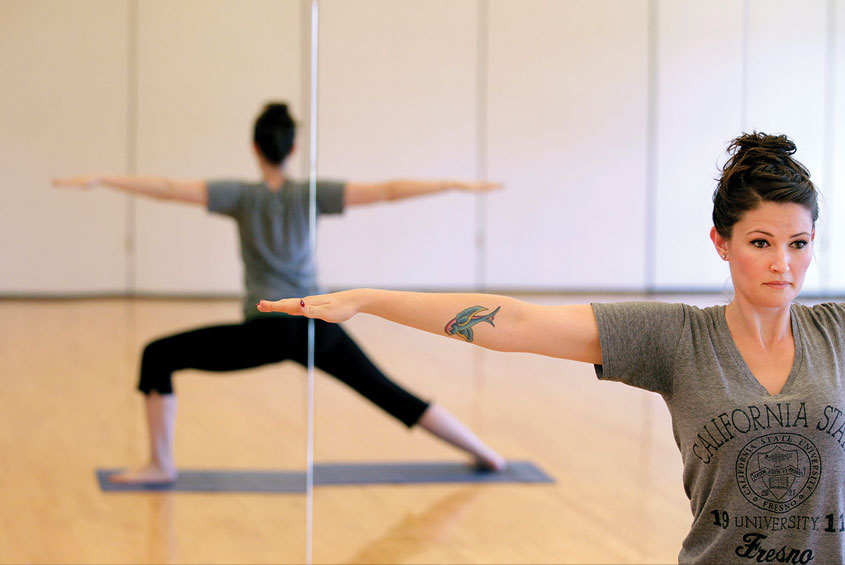
Dr. Mark Baldis, an exercise physiologist and lecturer in the Department of Kinesiology at Fresno State, said it’s important for people to take care of their mental and physical health while working or learning from home.
“It is thought that exercising improves mood and decreases anxiety and depression by releasing certain brain chemicals that have this effect,” Baldis says. “Also, exercise improves physical fitness, which translates into increased strength, meaning that we can perform our regular tasks with greater efficiency, leading to less fatigue.”
Baldis shared five ways people can maintain physical activity, while practicing social distancing.
- Go for a walk. This form of moderate exercise has been proven to reduce stress and anxiety, and when paired with music, the effects are even greater. A 10- to 15-minute walk around the house or in the neighborhood, two to three times a day, is ideal.
- Just get moving. Start with activities that require little to no equipment, like dancing, jumping rope and strength training. “There are thousands of free videos and resources out there, especially on YouTube and on your phone apps,” Baldis says. “I would encourage people to take advantage of these services, especially now with technology being more advanced and accessible.”
- Tai chi. The slow and steady movements are especially helpful for the older population as it helps maintain balance and focus.
- Plant a garden and/or do yard work. Through this hobby, individuals are able to move their muscles in small but effective ways that will have long-term positive impacts on the body. “Not only does your body benefit, but in a few months you’ll reap the rewards of your hard work with healthy foods from your garden, including vegetables and fruits,” Baldis says. “The benefits are positive all around.”
- Meditation. Letting your mind succumb into a state of relaxation is the key to this activity. There are many phone apps with daily meditation exercises.
Above all else, Baldis says it’s important to realize that being physically active does not have to involve exercise. “You can exercise in other ways without breaking a sweat,” Baldis says. “In fact, health benefits are much greater for people who move more and sit less.”
—Melissa Tav
Temporary Test Analysis Site
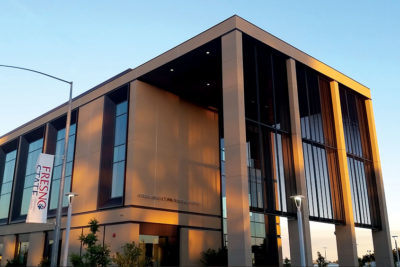 The County of Fresno and Fresno State partnered in April to set up a temporary public health laboratory on campus to enhance local capacity for timely and accurate COVID-19 testing analysis. Located in the Jordan Agricultural Research Center at Fresno State, the lab supports an analysis of 100 to 200 test specimens each day, using a testing method known as polymerase chain reaction.
The County of Fresno and Fresno State partnered in April to set up a temporary public health laboratory on campus to enhance local capacity for timely and accurate COVID-19 testing analysis. Located in the Jordan Agricultural Research Center at Fresno State, the lab supports an analysis of 100 to 200 test specimens each day, using a testing method known as polymerase chain reaction.
“We are pleased to be a partner with Fresno County in serving the needs of our city and region,” said Fresno State President Joseph I. Castro on April 14. “While the County’s Department of Public Health manages this Herculean task, we will do all we can to be helpful to them during this challenging time.”
The county purchased the lab equipment and received a Clinical Laboratory License from the California Department of Public Health. To adhere to California-mandated safety protocols, the on-campus laboratory receives and houses collected specimens, as swab tests continued to be conducted offsite.
This is a temporary location for this lab as the county rebuilds its 6,500 square foot laboratory that was destroyed due to flooding in 2018.
—Lisa Boyles
School’s Virtual for Summer
To help speed up their progress toward graduation during stay-home orders, more than 200 online classes were made available at Fresno State this summer through the Division of Continuing and Global Education.
“Students wanting to stay on track or get ahead in coursework for graduation [were] encouraged to take classes in May-June intersession and summer session,” says Dr. Daniel Bernard, associate dean of Continuing and Global Education. Faculty, in consultation with their departments, determined which courses and laboratories could be converted to a virtual modality, Bernard says.
Free Courses for Essential Workers
In support of those who continued to provide service during the COVID-19 situation, the Division of Continuing and Global Education offered three online, professional development courses free of charge in May and June for essential workers: “Teaching Online,” “Functional Spanish for Emergency Medical Responders,” and “Project Management for the Workplace.”
—Susan Hawksworth
AROUND THE FOUNTAIN
Autism Services Adapt

During the coronavirus situation, many families who have children or adults with autism spectrum disorder faced the suspension of in-person schooling, day programs and essential services they were used to receiving.
Since 2009, graduate students in Fresno State’s Applied Behavior Analysis master’s degree program have worked at Focused Behavioral Services at Fresno State to gain hands-on experience working with autistic children and adults.
Although social distancing rules disrupted students’ efforts to work in person with their clients, essential services continued for 90% of clients.
“Focused Behavioral Services has served hundreds of families in the Central Valley over the last 10 years, and we [were] proud to continue to do so, virtually, throughout the current coronavirus crisis,” says Dr. Marianne Jackson, clinical director for Focused Behavioral Services. “Our students and staff continued to gain relevant experience while supporting individuals and families affected by Autism Spectrum Disorders in the local community.”
The Department of Psychology program provides students with the education and paid, supervised experience required to become board certified.
The program loaned iPads to families who did not have access to a smartphone or computer. “We have had to drastically alter how we deliver services in a short period of time, transitioning from in-person services to telehealth,” says Matisse Lovett, a Fresno State graduate student. “While this has, of course, been challenging and not without road bumps, it has been encouraging to see our staff and the families we work with come together to find innovative ways for us to continue to support our clients during these difficult times.”
Families seeking support for a loved one with autism can call 559.278.6779 or email fbs_admin@mail.fresnostate.edu.
—Selene Kinder
From Shirts to Masks
What started as an idea in the office of Trademark Licensing to make use of a stockpile of unlicensed shirts, turned into a substantial donation of face masks for local health care professionals.
Each year, the office collects counterfeit Fresno State shirts being illegally sold at or near events. About 300 such shirts had been confiscated or turned over in recent years. In addition, the office partnered with the Athletics Department and Kennel Bookstore to gather about 600 more surplus shirts that could be repurposed into masks.
From the 900 total shirts, about 3,000 masks are being produced by staff and community volunteers who are cutting and sewing the material. Due to the high demand and low supply of elastic and ribbon, material from the shirts is being used for face coverings and ties. The initial donation of 500 masks was delivered by TimeOut to Community Regional Medical Center on May 8 to help protect those on the frontlines of health care. Thanks to a partnership with Port of Subs, the group also delivered 500 sandwiches for hospital personnel.
—Eddie Hughes

4 Tips to Promote Mental Wellness
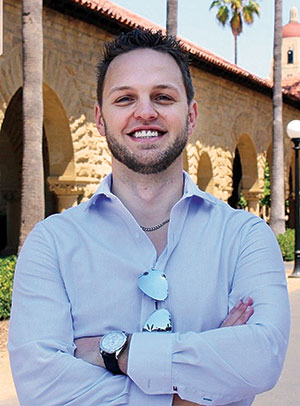 Though the effects of the COVID-19 outbreak on mental health have not been systematically studied, it is anticipated there will be rippling effects based on public reaction, said Chris Miller, a neuroscientist and psychology professor at Fresno State.
Though the effects of the COVID-19 outbreak on mental health have not been systematically studied, it is anticipated there will be rippling effects based on public reaction, said Chris Miller, a neuroscientist and psychology professor at Fresno State.
Miller studies the neural basis of mental disorders such as depression and anxiety using neuroimaging tools such as functional magnetic resonance imaging. Individuals respond to crises in wide-ranging ways that generally involve the activation of a biological circuit known as the hypothalamic-pituitary-adrenal (HPA) system. When the HPA system is activated, the hormone cortisol is released into the bloodstream. That is a normally healthy response that enables the body to cope with an immediate stressor, Miller says.
However, chronically high levels of cortisol are toxic to brain regions such as the hippocampus, an important structure in memory formation, and can cause various health problems such as fatigue, difficulty sleeping, anxiety, irritability, headaches, hypertension, digestive upset and diminished immune function.
It is important to understand there are proactive steps individuals can take to manage stress and promote greater mental health during this time, Miller says. Here are Miller’s four tips:
- Promote social connections with loved ones. This includes both reaching out for interactions and for help (while maintaining appropriate physical distancing when possible) as well as providing such support to others. Social support is one of the most important predictors of mental health and is something we can largely control.
- Participate in stress-relief activities. Self-care strategies vary among individuals, but often include exercise, meditation, reading, playing games, multimedia entertainment and social interactions. Remember that you can lean on these behaviors and routines to help you manage stress better when needed.
- Adopt a positive perspective. Though it’s important to be realistic about the negative impact of this situation, it’s also helpful to engage in positive reappraisal of the situation and consider how it may allow you to focus on other things such as adopting a new hobby, taking more time for yourself and focusing on nurturing close relationships.
- Maintain physical health. In addition to the psychological strategies above, maintaining physical health will likely help you manage stress levels and maintain mental health. This includes daily activities such as healthy dieting and exercising as well as managing medical conditions.
—Selene Kinder
What’s New on the Campus Farm?
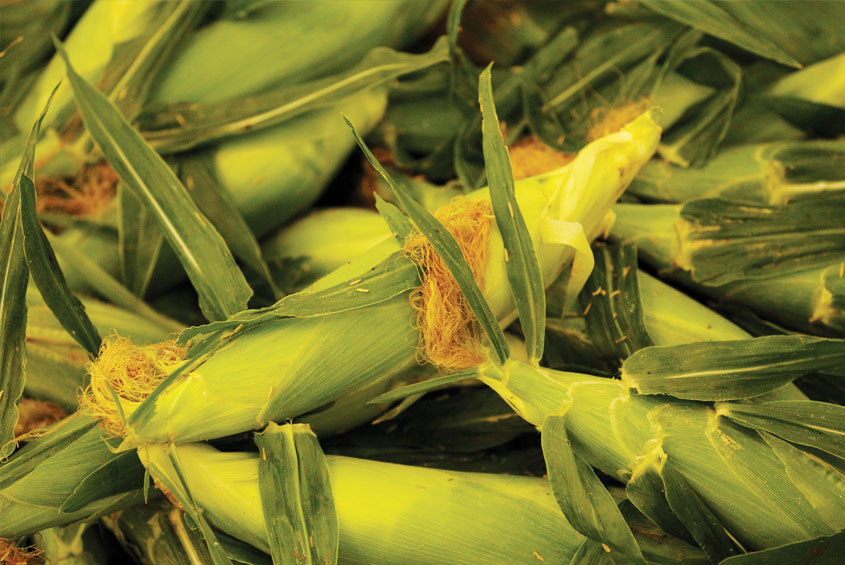
Like other essential agricultural operations across the Central Valley, the 1,000-acre University Agricultural Laboratory has kept up a near-normal pace over the past month, thanks to its workforce that relies partially on students who are dedicated to gaining hands-on career experience. Campus farm manager Mark Salwasser, a 1988 alumnus, gives an update on what’s new at the Gibson Farm Market.
(And, yes, that famous Fresno State sweet corn is now available while supplies last.)
FS Mag: Any new things to look for at the Gibson Farm Market?
Salwasser: We’re growing strawberries for the first time in several years. We were trying to give customers another product in the early spring time to go with the asparagus. They’re selling really well, and we’re just getting into the production levels since the rain had slowed their growth in [March].
FS Mag: Any other new things to look for on the campus farm?
Salwasser: The winery is planning on canning our Tailgate wines for the first time in 375-milliliter single cans — a little over 12 ounces — and four-packs that will be fan-friendly for the football games. They’ll also tentatively continue their bottling dates if they can.
FS Mag: What about any changes in the summer and fall?
Salwasser: We’re transitioning our full olive orchard into organic status, and we’re in the final stage of the three-year phase, which will be completed in August. We grow three varieties — Koroniki, Arbosana and Arbequina — and those olives lend themselves to being organic because they don’t have a lot of insect issues, and the returns are significant for organic olive oil. We also wanted some more organic ground on the farm.
FS Mag: Is the Gibson Farm Market still open extended hours?
Salwasser: Yes, 8 a.m. to 6 p.m. Monday through Sunday until mid-July. Certain areas are selling well, like our meats section, so our meats lab has picked up production. The creamery is also continuing to focus on making ice cream and cheese. We’re trying to keep it open for our community, for our neighbors and friends to help provide key food products for students and area families.
—Geoff Thurner






